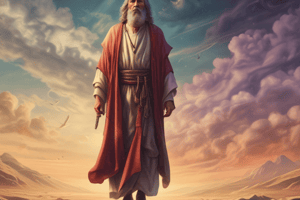Podcast
Questions and Answers
Which of the following best represents the central concept of Augustine's Civitas Dei?
Which of the following best represents the central concept of Augustine's Civitas Dei?
- The spiritual community of believers, distinct from the earthly city but influencing it. (correct)
- A set of military strategies for defending Christian territories against pagan invasions.
- The idea that secular governments should always be subordinate to religious authority.
- A literal, earthly kingdom established by the Christian church to enforce divine law.
In what way did the Investiture Controversy primarily challenge the existing power structures in medieval Europe?
In what way did the Investiture Controversy primarily challenge the existing power structures in medieval Europe?
- By asserting the supremacy of secular rulers in appointing church officials, challenging papal authority. (correct)
- By advocating for the complete separation of church and state, limiting papal influence.
- By promoting democratic elections for church leadership, undermining monarchical power.
- By questioning the legitimacy of the Pope's spiritual authority over sacraments.
How did the Edict of Milan, issued in 313 AD, impact the early development of Christianity within the Roman Empire?
How did the Edict of Milan, issued in 313 AD, impact the early development of Christianity within the Roman Empire?
- It solidified Christianity as the official state religion of the Roman Empire, suppressing all other faiths.
- It initiated a period of intense persecution against Christians who refused to join the Roman army.
- It granted religious tolerance, ending persecution and allowing Christians to practice their faith openly. (correct)
- It mandated that all Roman citizens must convert to Christianity within a five-year period or face exile.
Which of the following statements best encapsulates Thomas Hobbes's view of human nature in Leviathan?
Which of the following statements best encapsulates Thomas Hobbes's view of human nature in Leviathan?
How did the concept of prima sedes a nemine iudicatur influence the development of papal authority?
How did the concept of prima sedes a nemine iudicatur influence the development of papal authority?
What is Apologetics?
What is Apologetics?
Who was Augustine?
Who was Augustine?
Define Biblical Literalism.
Define Biblical Literalism.
Who was Charlemagne?
Who was Charlemagne?
What does the term 'Christos' refer to?
What does the term 'Christos' refer to?
What was the Donation of Constantine?
What was the Donation of Constantine?
What was the Edict of Milan?
What was the Edict of Milan?
What was the English Civil War?
What was the English Civil War?
Who was Gregory the Great?
Who was Gregory the Great?
Who was Henry VIII?
Who was Henry VIII?
What is Historical Criticism?
What is Historical Criticism?
Who was Justin Martyr?
Who was Justin Martyr?
What is the Letter to Diognetus?
What is the Letter to Diognetus?
What does the term 'Libido Dominandi' mean?
What does the term 'Libido Dominandi' mean?
What is the Pentateuch?
What is the Pentateuch?
What does 'Prima sedes a nemine judicatur' mean?
What does 'Prima sedes a nemine judicatur' mean?
What does 'Summum bonum' mean?
What does 'Summum bonum' mean?
Who was Tertullian?
Who was Tertullian?
Who was Aquinas?
Who was Aquinas?
What is Biblical Hermeneutics?
What is Biblical Hermeneutics?
Define Civitas Dei.
Define Civitas Dei.
What is Christendom?
What is Christendom?
Who was Constantine?
Who was Constantine?
What does 'Duo sunt' mean?
What does 'Duo sunt' mean?
What was the Edict of Thessalonica?
What was the Edict of Thessalonica?
What was the English Reformation?
What was the English Reformation?
Who is Harry Frankfurt?
Who is Harry Frankfurt?
Who was Hobbes?
Who was Hobbes?
What was the Investiture Controversy?
What was the Investiture Controversy?
What is Leviathan?
What is Leviathan?
What was the Magisterial Reformation?
What was the Magisterial Reformation?
Who were the Sophists?
Who were the Sophists?
What is 'Summa Theologiae'?
What is 'Summa Theologiae'?
Who was Thomas Müntzer?
Who was Thomas Müntzer?
What is the Torah?
What is the Torah?
Who was Trajan?
Who was Trajan?
Considering the biblical passages we read earlier in class, in what respects can it be said that these passages outline a “political” vision?
Considering the biblical passages we read earlier in class, in what respects can it be said that these passages outline a “political” vision?
How did Constantine contribute to the rise of Christendom?
How did Constantine contribute to the rise of Christendom?
According to Aquinas, what are the best and worst forms of government, and why?
According to Aquinas, what are the best and worst forms of government, and why?
Please describe Luther's "Two Kingdoms" model.
Please describe Luther's "Two Kingdoms" model.
How does Hobbes describe the “state of nature", and how should government respond to this?
How does Hobbes describe the “state of nature", and how should government respond to this?
Which of the following actions taken by Constantine was most instrumental in fostering the growth of Christendom?
Which of the following actions taken by Constantine was most instrumental in fostering the growth of Christendom?
In Aquinas's view, what distinguishes the best forms of government from the worst?
In Aquinas's view, what distinguishes the best forms of government from the worst?
How does Luther's 'Two Kingdoms' model differentiate between the roles of secular and spiritual authority?
How does Luther's 'Two Kingdoms' model differentiate between the roles of secular and spiritual authority?
According to Hobbes, what is the primary motivator that drives individuals in the 'state of nature'?
According to Hobbes, what is the primary motivator that drives individuals in the 'state of nature'?
How did the Donation of Constantine, although later proven a forgery, impact the development of papal power in the medieval period?
How did the Donation of Constantine, although later proven a forgery, impact the development of papal power in the medieval period?
Flashcards
Apologetics
Apologetics
Defense of the Christian faith through reasoned arguments.
Civitas Dei
Civitas Dei
Also known as the City of God; Augustine's concept of a heavenly city distinct from earthly cities.
Christendom
Christendom
The historical period and societal structure where Christianity heavily influenced or dominated political and social life.
Donation of Constantine
Donation of Constantine
Signup and view all the flashcards
Edict of Milan
Edict of Milan
Signup and view all the flashcards
Biblical Hermeneutics
Biblical Hermeneutics
Signup and view all the flashcards
Biblical Literalism
Biblical Literalism
Signup and view all the flashcards
Christos
Christos
Signup and view all the flashcards
Constantine
Constantine
Signup and view all the flashcards
Edict of Thessalonica
Edict of Thessalonica
Signup and view all the flashcards
English Civil War
English Civil War
Signup and view all the flashcards
English Reformation
English Reformation
Signup and view all the flashcards
Leo the Great
Leo the Great
Signup and view all the flashcards
Libido Dominandi
Libido Dominandi
Signup and view all the flashcards
Magisterial Reformation
Magisterial Reformation
Signup and view all the flashcards
Pentateuch
Pentateuch
Signup and view all the flashcards
Prima sedes a nemine judicatur
Prima sedes a nemine judicatur
Signup and view all the flashcards
Sophists
Sophists
Signup and view all the flashcards
Summum bonum
Summum bonum
Signup and view all the flashcards
Summa theologiae
Summa theologiae
Signup and view all the flashcards
Thomas Müntzer
Thomas Müntzer
Signup and view all the flashcards
Torah
Torah
Signup and view all the flashcards
Trajan
Trajan
Signup and view all the flashcards
Gregory the Great
Gregory the Great
Signup and view all the flashcards
Investiture Controversy
Investiture Controversy
Signup and view all the flashcards
Political Theology
Political Theology
Signup and view all the flashcards
Aquinas
Aquinas
Signup and view all the flashcards
Augustine
Augustine
Signup and view all the flashcards
Charlemagne
Charlemagne
Signup and view all the flashcards
Hobbes
Hobbes
Signup and view all the flashcards
Study Notes
- Apologetics: Defense of the Christian faith through reasoned arguments.
- Aquinas: Influential philosopher and theologian synthesizing Aristotelian philosophy with Christian theology.
- Augustine: Early Christian theologian and philosopher known for writings on grace, sin, and the nature of God.
- Biblical Hermeneutics: Study of the principles and methods of interpreting the Bible.
- Biblical Literalism: Interpreting the Bible based on the plain meaning of words.
- Civitas Dei: Latin for "City of God," concept in Christian theology referring to the spiritual city ruled by God, in contrast to the earthly city.
- Charlemagne: Medieval emperor who ruled much of Western Europe and promoted Christianity.
- Christendom: The worldwide body or society of Christians.
- Christos: Greek word for "anointed one," referring to Jesus as the Messiah.
- Constantine: Roman emperor who legalized Christianity and played a significant role in its spread.
- Donation of Constantine: Forged Roman imperial decree by which Emperor Constantine I supposedly transferred authority over Rome and the western part of the Roman Empire to the Pope
- Duo sunt: Latin for "there are two," referring to the dual authority of church and state.
- Edict of Milan: Proclamation that permanently established religious toleration for Christianity within the Roman Empire
- Edict of Thessalonica: Issued in 380 CE, made Nicene Christianity the state religion of the Roman Empire.
- English Civil War: Series of armed conflicts and political machinations between Parliamentarians and Royalists.
- English Reformation: Series of events in 16th-century England by which the Church of England broke away from the authority of the Pope and the Roman Catholic Church.
- Gregory the Great: Pope who promoted the Gregorian Chant and asserted papal authority.
- Harry Frankfurt: 20th century philosopher.
- Henry VIII: King of England who broke with the Catholic Church and established the Church of England.
- Hobbes: Philosopher known for his work on political philosophy, including the concept of the social contract.
- Historical Criticism: Analyzing the Bible in its historical and cultural context.
- Investiture Controversy: A conflict in the 11th and 12th centuries between the Church and the Holy Roman Empire over the ability to appoint local church officials.
- Justin Martyr: Early Christian apologist who defended Christianity against pagan criticisms.
- Leo the Great: Pope who asserted papal authority and played a significant role in shaping early Christian doctrine.
- Letter to Diognetus: Early Christian apologetic work that explains Christian beliefs and practices to a non-Christian audience.
- Leviathan: Work of political philosophy by Thomas Hobbes.
- Libido Dominandi: Latin phrase meaning "lust for power," which Augustine used to describe the root of sin.
- Magisterial Reformation: Reformation supported by the ruling authorities.
- Pentateuch: The first five books of the Hebrew Bible.
- Pliny: Roman author, administrator, and natural philosopher.
- Prima sedes a nemine judicatur: Latin phrase meaning "the first see is judged by no one," referring to the authority of the Pope.
- Sophists: Ancient Greek teachers who emphasized rhetoric and argumentation.
- Summum bonum: Latin phrase meaning "the highest good," which philosophers have sought to identify as the ultimate goal of human life.
- Summa theologiae: Comprehensive summary of theology written by Thomas Aquinas.
- Tertullian: Early Christian author who defended Christianity against heresy.
- Thomas Müntzer: Early Reformation-era German theologian.
- Torah: The first five books of the Hebrew Bible.
- Trajan: Roman emperor.
Short Answer Questions
- Biblical Passages and Political Vision: Consider how biblical passages outline a political vision.
- Constantine's Contribution: Explain how Constantine contributed to the rise of Christendom.
- Aquinas on Government: Understand Aquinas' views on the best and worst forms of government, and the reasoning behind them.
- Luther's "Two Kingdoms" Model: Describe Luther's "Two Kingdoms" model.
- Hobbes on the State of Nature: Explain how Hobbes describes the "state of nature" and the role of government in response.
Studying That Suits You
Use AI to generate personalized quizzes and flashcards to suit your learning preferences.




